TUSCALOOSA, Ala. – A record 10 University of Alabama students have been named to USA Today’s 2010 All-USA College Academic Team. Once again, UA led the nation with the most students on the team, and set a record for the most students any university has ever placed on the team in a single year.
UA students Alan Blinder, a journalism and political science major from Norcross, Ga.; Connor Johnson, a biology major from Cullman; Kendra Key, a political science major from Tuscaloosa, and Dana Lewis, a public relations and political science major from Huntsville, were named to the Second Team.
Joy Driver Aldridge, a chemical and biological engineering major from Clanton; Richard Cockrum, a biochemistry major from Northport; Susan DeLeon, a biology major from San Antonio, Texas, and Amy Frees, a chemical engineering major from Huntsville, were named to the Third Team.
Kalen Berry, a biology major from Hartselle, and Rebecca Long, a chemistry major from Vestavia Hills, were named Honorable Mentions.
Seven of the students – Key, Lewis, Aldridge, DeLeon, Frees, Berry and Long – graduated from UA in May. Blinder, Johnson and Cockrum expect to graduate in May 2011.
According to USA Today, judges selecting team members considered grades, leadership, activities and, most importantly, how students extend their intellectual talents beyond the classroom.
Following UA in total numbers were Johns Hopkins University and Washington University in St. Louis with five team members each and the University of North Carolina and the U.S. Naval Academy with four.
UA has had great success placing students on the national team that honors the “best of the best” undergraduate academic all-stars from across the nation, having placed 46 students on the team since 2003. In addition to this year, UA also had the most students on the list in 2009 with five, in 2008 with seven, in 2006 with six and in 2005 and 2003, both with five, and tied with Washington University in St. Louis in 2007 with four.
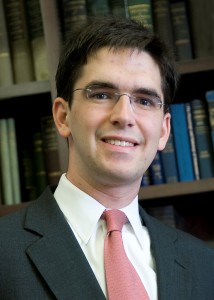
Alan L. Binder, USA Today All-USA College Academic Team, Second Team
Hometown: Norcross, Ga.
Majors: Journalism, Political Science
Career Goal: Journalist
“I didn’t know a child could have a stroke” – that’s a phrase that Alan Binder grew weary of hearing. So he decided to do something about it. Blinder, a journalism and political science major at UA, wants you, and everybody else, to know about pediatric strokes.
“Sometimes when my inbox chimes, I open my e-mail to find a message from a parent of a stroke victim,” says Blinder, a USA Today second-team winner from Norcross, Ga. “Often, they simply congratulate us on our work. But, from time to time, they say that they learned about stroke from us, and that information saved their child’s life.”
At UA, Blinder founded and coordinated the Pediatric Stroke Initiative, an interdisciplinary team of students and professionals from a variety of fields, including neurology and electrical engineering. The initiative meets weekly to coordinate awareness-raising activities. For example, the initiative distributed an educational film Blinder produced for his Eagle Scout project throughout the state, and is working with the U.S. Congress to produce legislation. Recently, the U.S. House of Representatives introduced a resolution on pediatric strokes after he and the group discussed the matter with U.S. Rep. John Boozman, R-Ark. Blinder and the initiative are also working on research into pediatric strokes; the International Pediatric Stroke Study has invited them to participate.
“He has continued to pursue his goals with a passion and a maturity rarely seen in someone of his age,” wrote Dr. E. Eugene Marsh, dean of UA’s College of Community Health Sciences. “As a stroke neurologist, I was particularly impressed with Alan’s Pediatric Stroke Initiative. His ability to articulate an idea and develop a plan in respectful collaboration with others, and to achieve buy-in from a wide variety of successful individuals is a rare commodity for anyone, especially someone at his age and level of training.”
In addition to his work with the initiative, Blinder has served as managing editor and opinions editor of The Crimson Write, UA’s student-run newspaper, and he is a University Fellow in the Honors College. He received the UA Outstanding Freshman Award in 2009, and his writing placed among the 10 top editorials in the William Randolph Hearst Foundation Journalism Awards. He has written articles for The Atlanta Journal-Constitution, The Birmingham News and other publications. Blinder is the son of David and Sally Blinder.
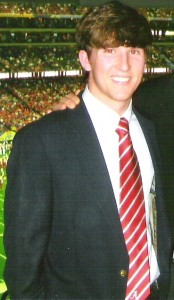
Patrick Connor Johnson, USA Today All-USA College Academic Team, Second Team
Hometown: Cullman
Major: Biology
Career Goal: Physician
Undergrads who want to pursue a career in medicine at UA have a new opportunity to get a taste of clinical treatment, thanks to Connor Johnson. Johnson’s big idea was to establish a class called Medicine and Community – a group of six undergraduates will head down to a diabetes clinic in Marion, Ala. and work beside doctors to assist patients in Perry County.
“The project will encourage integration among all the levels of medical education, provide clinical experiences in basic community settings and augment the ability of each student to work in a medical team,” says Johnson, a biology major from Cullman, “Through our work, UA is becoming a leader in premedical education, and we hope to see other universities follow in uniting outreach and education in the medical field.”
The class will have four components: a seminar on working in a diabetes clinic; the development of the clinic; hands-on experience at the clinic; and a shadow component in which the students will work closely with physicians from a variety of specialties.
“While there are many premedical programs nationwide, there are none that I know of that use premedical students to help deliver care to an underserved area,” says Dr. Chelley K. Alexander, chair of the family medicine department and assistant dean for graduate medical education at UA’s College of Community Health Sciences. “Connor has chosen to apply his best qualities – leadership, vision, determination and charisma – to affect the lives of his fellow students and the lives of our poorest Alabamians.”
Johnson also is working on an International Medical Opportunities initiative, which will integrate UA’s Study Abroad Program for undergraduates with medical trips Alabama physicians take to Egypt, Ghana and Honduras. The programs are set to begin in summer 2011.
“Each trip will provide clinical experiences while giving insight into the culture of the area,” Johnson says.
Johnson’s honors include receiving a Hughes Undergraduate Fellow award in 2008; a Moral Forum Debate Champion award in 2007; and Organic Chemistry Student of the Year in 2009. He has participated in UA’s Computer-Based Honors Program and the Honors College Ambassadors Program, and he serves as a mentor for four premedical students. Johnson’s parents are Dean and Beth Johnson.
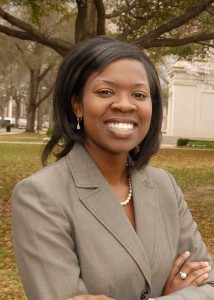
Kendra Key, USA Today All-USA College Academic Team, Second Team
Hometown: Tuscaloosa
Major: Political science
Kendra Key stood out during her years at UA for her organizational and volunteer efforts. She worked on many projects, including the SaveFirst Initiative, a financial literacy and free-tax-preparation program for low-income families. She created the Office of International Involvement through her work with UA’s Student Government Association, and she organized a group discussion on race and ethnicity on the UA campus.
Her scholastic and volunteer efforts enabled Key, a recent graduate from Tuscaloosa, to win a prestigious Truman Scholarship for students who show exceptional leadership potential. Key also was one of the first members of UA’s Center for Ethics & Social Responsibility Scholars.
“Her volunteerism and engagement have been spectacular as she reached across the campus and into communities across our state,” says Stephen F. Black, director of the Center for Ethics & Social Responsibility at UA. “Over the last three years, I have witnessed Kendra’s deepening awareness of and commitment to the needs of the world that exists beyond her own experience. She has shown profound maturity and sincere understanding of the need for both charity and justice.”
In addition, Key, a political science major and member of the Honors College, initiated the University of Alabama Recycling Initiative and helped to raise more than $40,000 for Spinal Muscular Atrophy.
Key was the 2008-2009 Blackburn Institute student chair and received the 2008 Capstone Hero Award. She also received the 2009 Realizing the Dream Horizon Award from the Tuscaloosa-based Martin Luther King Jr. Realizing the Dream Committee. Key is the daughter of Nathaniel and Betty Key.
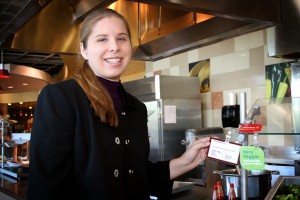
Dana Lewis, USA Today All-USA College Academic Team, Second Team
Hometown: Huntsville
Majors: Public relations and political science
Career goal: Public health communications/public relations
Twitter may be full of frivolous messages, but Dana Lewis, who is focused on health communications, decided to get serious with the social-media website. In January 2009, she started the Heathcare Communications and Social Media Community, a Twitter conversation with the hashtag #hcsm. The conversation, along with a moderated account called @HealthSocMed, lets health-communication professionals discuss how they can improve people’s lives, 140 characters at a time.
“#hcsm gives everyone the opportunity to open-source their problems or questions about healthcare communications and social media and collaborate on industry-wide projects,” says Lewis, a UA public relations and political science major from Huntsville. “By using Twitter, #hcsm breaks down the age, experience, geographical and other barriers that often hinder an open dialogue in healthcare.”
Lewis brought extensive experience in health communications to bear on her Twitter project – as a teenager, she founded Planet D, a website for children with diabetes, and she created and chaired the 2009 Step Out: Walk to Fight Diabetes fund-raiser in Tuscaloosa. She also received the 2009 Society for New Communications Research Excellence Award for best use of nonprofit microblogging.
“In my estimation, one of the best traits a young person can exhibit is initiative, because nothing of value happens without someone with a vision starting it,” says Lee Aase, manager of syndication and social media for the Mayo Clinic in Rochester, Minn. “Dana combines this initiative with the persistence to keep the project going. Her knowledge is not just theoretical but also practical.”
Lewis also has received the 2009 John Fraser Ramsey Premier Award from UA as well as the 2009 Charles L. Seebeck Award for the most outstanding Computer-Based Honors student. She was the materials manager for Alabama Action, a community service program for UA freshmen, and performed Web and social media tasks for the BamaBike Program and UA’s student newspaper, The Crimson White. She also was a 2008 USA Today All-USA College Academic Team second-team member.
In addition, Lewis was a Blackburn Fellow and has written and given presentations on health communications and social media in Philadelphia and Birmingham. She is the daughter of Ron and Doris Lewis.
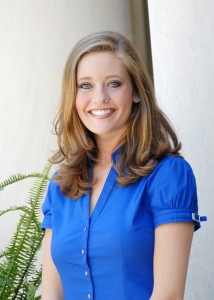
Joy Driver Aldridge, USA Today All-USA College Academic Team, Third Team
Hometown: Clanton
Major: Chemical and Biological Engineering
Career Goal: Chemical or Environmental Engineer
Uncertainties hang around climate-change models. For example, scientists are trying to figure out how aerosols will affect temperature change – in fact, aerosols may represent the No. 1 issue to resolve in creating accurate models of climate change. Joy Driver Aldridge, a UA chemical and biological engineering major from Clanton, wants to clear up some of that uncertainty.
Aldridge’s research as a National Oceanic and Atmospheric Administration intern at the Mauna Loa Observatory involves testing an instrument that measures aerosols more accurately. The instrument, called a nephelometer, can measure aerosol particles “directly at all angles, while the current design requires calculations and estimates to be made,” Aldridge says. Her job was to troubleshoot the instrument and perform a series of experiments under varying conditions. Her research improved the nephelometer so much that it is being incorporated into a patent application.
“I worked to fine-tune the instrument until it produced consistent and accurate results,” she says. “After my internship, the observatory was left with an extensive amount of insight. This internship was an enormous challenge because within only nine weeks, I learned about aerosols, climate models, a complex computer programming language and the operation of an instrument that was not only foreign to me but new to the world.”
In addition to the internship, Aldridge has worked at Southern Nuclear in the Environmental Affairs Department. Her responsibilities have included chemical inventories, waste and recycling issues, radiological data, drinking and surface water reports and environmental stewardship programs. She has also worked with Dr. Alan M. Lane, UA professor of chemical engineering, on a research group working on fuel-cell catalysts.
“Joy is an outstanding individual with extremely high standards and the ability to make a difference in the community through selfless and significant service and leadership,” Lane says. “She is also passionate about environmental issues and desires to make a difference.”
Aldridge received a Hollings Scholarship, a National Academy for Nuclear Training Scholarship and a Southern Excellence Award from the Southern Company. She is active in the Student Government Association, the American Institute of Chemical Engineers, Golden Key International Honor Society, and Future Alumni for Tradition and Excellence.
Married since she graduated from UA in May, she is the daughter of Keith and Chrisie Driver.
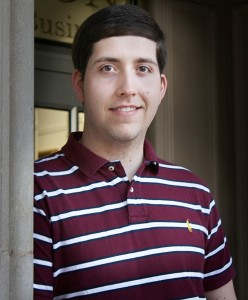
Richard Cockrum, USA Today All-USA College Academic Team, Third Team
Hometown: Northport
Major: Biochemistry
Career Goal: Public Health Policy
Studying the effects of chemical weapons of mass destruction on the public can be difficult if not impossible – the weapons are illegal to own, and field tests would be much too expensive.
But Richard Cockrum, a UA biochemistry major, has a solution: He’s using a computer program to explore how these gases behave once released. How fast will they decompose? How do they first react in the cells of our bodies? These are critical questions. Cockrum sees his research as contributing to protecting human lives from the effects of these gases – a high calling for an undergraduate at a keyboard.
“In this project, I am investigating their decomposition in the atmosphere,” says Cockrum. “After two years of calculations and spreadsheets, I feel confident that this data will not just sit in a filing cabinet gathering dust. It can be immediately applied to help society.”
Cockrum presented his research at the 2009 Southern Regional Honors Conference and is preparing a manuscript. His adviser, Dr. David A. Dixon, sees the implications of Cockrum’s work for the safety of humanity.
“These results will help to develop approaches to minimize the impact of chemical weapons of mass destruction on humans and enable more rapid environmental cleanup,” says Dixon, Robert Ramsay chair in UA’s chemistry department. “Richard has made significant contributions to the development of computer-based technologies to improve our understanding of the chemistry of chemical weapons. This will enable the United States to better protect its population.”
In addition to his work in predicting the behavior of these weapons, Cockrum was a Hollings Scholar with the National Oceanic and Atmospheric Administration; received an Outstanding Undergraduate Research award in Computer-Based Honors; and is a UA University Fellow. He also served as president of Lambda Sigma, a sophomore honor society; he planned three service projects, including a mural for the local animal shelter. Cockrum is the son of Ricky and Elizabeth Cockrum.
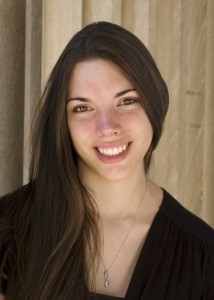
Susan DeLeon, USA Today All-USA College Academic Team, Third Team
Hometown: San Antonio, Texas
Major: Biology
When Susan DeLeon got the chance to work in UA’s Caldwell Lab, she dug in. Her work on several projects involving research into Parkinson’s disease has brought her numerous honors, including notice on the Michael J. Fox Foundation Web site and recognition as a Parkinson’s Association of Alabama Scholar in 2009.
“Through my involvement in several projects, I have been able to tackle research on Parkinson’s disease from several angles,” says DeLeon, a biology major at UA. “This amazing experience has granted me the opportunity to help accelerate the development of treatments for a major disease and a new purpose on life.”
DeLeon, who is from San Antonio, Texas, and the lab recently were working on micro-RNA research, a recent development in the field of neuronal diseases, as well as analyzing the genetically traceable nematode C. elegans. Because of her work in the lab, she was able to co-author an article in the journal PLOS One. She also introduced an advanced research technique that will help validate the lab’s findings. But what makes her stand out in the collaborative world of scientific exploration is her selflessness.
“Susan exemplifies excellence of character and service to humanity,” says Dr. Kim Caldwell, associate professor of biological sciences. “As a member of our laboratory, when a fellow lab member needs assistance with a research project, one of the first people who steps up to help is Susan. Because she is willing to put others’ needs ahead of her own, Susan already has earned authorship on an important research article.”
DeLeon’s parents are Mario and Susan DeLeon.
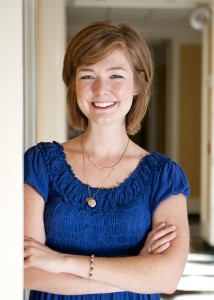
Amy E. Frees, USA Today All-USA College Academic Team, Third Team
Hometown: Huntsville
Major: Chemical Engineering
Career Goal: Pharmaceutical development for disease therapy
Watching a former neighbor suffer from advanced colon cancer, Amy Frees wondered how the treatments for the disease could be improved.
“Seeing her battles, as well as her encouraging progress against the disease, motivates me to continue developing better cancer treatment options,” says Frees, a chemical engineering major from Huntsville. “Although my research is not healing my neighbor, someone’s is. Building on the endeavors of those who have come before, I strive to play a part in advancing cancer therapy.”
Frees wanted to explore how researchers could improve the efficacy of the treatments while cutting down such side effects as vomiting and permanent organ damage. Drugs used to treat the disease are difficult to administer in the correct way without causing additional problems. So she approached her faculty adviser, Dr. Chris Brazel, and off she went.
She and her group tackled the problem from two angles: drug release itself and a system to test drug release. First, she wanted to improve the usefulness of treating the cancer with hyperthermia – heating the tissue to destroy the cancer.
Toward that goal, she worked on developing a polymer that released the drug “at a temperature high enough to kill cancer cells but low enough to preserve surrounding tissue,” she says. “Next, I co-designed a system that tests drug release while mimicking physiological conditions. The system applies a magnetic field to a polymer sample, induces a phase change and records drug release using ultraviolet-visible spectroscopy.”
Her poster based on her research, “Novel Materials for Triggered Cancer Therapy: Pulsed Release from Thermally-Responsive Polymer Gels,” was selected in 2009 as the national winner of the Society of Women Engineers’ undergraduate poster competition. She also placed second in the American Institute of Chemical Engineers Southeast Regional Poster Competition.
Frees’ independence impressed Brazel – at their first meeting, he says, “she immediately struck me as one of those few students who could really chart her own course, and be very successful while doing it.”
“Amy has a great intellectual curiosity and is not afraid of approaching new and challenging activities,” says Brazel, associate professor of chemical and biological engineering. “At the same time, Amy is quite personable and works well in teams.”
In addition to her research activities, Frees served as president of Engineers Without Borders, was inducted into the Tau Beta Pi engineering honor society and taught English in Guangdong Province, China, as part of a UA group of students who traveled there in 2008. She is the daughter of Jim and Pam Frees.
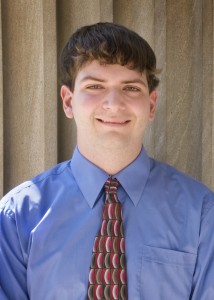
Kalen P. Berry, USA Today All-USA College Academic Team, Honorable Mention
Hometown: Hartselle
Major: Biology
Career Goal: Research Professor
The Republic of Kilibati – a chain of islands in the tropical Pacific formerly known as the Gilbert Islands – is a long way from UA and Hartselle, Ala., the hometown of Kalen Berry. But UA brought Berry together with a graduate student from the island nation, and that working relationship inspired Berry to bring a series of lectures to Kilibati to inspire the nation’s students to careers in medicine.
Berry worked with the grad student, Bwarenaba Kautu, to overcome barriers of technology and language to try to stream video to Kilibati. When that effort didn’t work – Internet blackouts and the slow connection speeds on the island thwarted the endeavor– Berry ended up uploading video lectures to YouTube.
“These videos already have begun to help students in Kiribati,” says Berry, a biology major and recent UA graduate. “Bwarenaba has been receiving e-mails from several students discussing his lectures.”
Berry’s efforts to help students in Kilibati run parallel to his research into epilepsy in the Caldwell Lab at UA, where Berry worked with Kautu. According to Dr. Guy A. Caldwell, associate professor of biological sciences at UA, Berry has used his talents in computer science, bioinformatics and molecular biology to create and build a microscope-mounted biological assay system that helps to investigate seizures. He co-authored an article for the Journal of Visualized Experimentation.
“Although Kalen has a calm, quiet demeanor, his enthusiasm is obvious when he has the opportunity to explain the details and value of his research to others,” says Dr. Shane Sharpe, dean of UA’s Honors College. “I have come to know Kalen as an inquisitive, socially responsible and well-rounded young man with a very strong work ethic.”
Berry has received a Goldwater Scholarship, the Jane Nix Outstanding Service Award, the Randall Outstanding Research Award and the H.H. Chapman Award for outstanding computer user at UA. He is part of the Computer Based Honors Program, the Lambda Sigma sophomore honor society and Alabama Action. His parents are Mark and Darnell Berry.
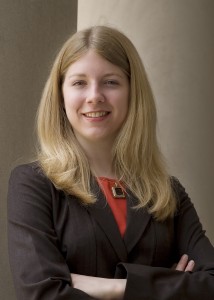
Rebecca T. Long, USA Today All-USA College Academic Team, Honorable Mention
Hometown: Vestavia Hills
Major: Chemistry
Career Goal: Chemistry professor
Forget the image of chemists wearing white coats and goggles, heating gases with Bunsen burners or pouring liquids from one beaker to another. Rebecca Long wants to explore the workings of chemicals using big-brained computers. Using high-powered computers, Long hopes to help researchers find catalysts that will change the rate of chemical processes and ultimately help to replace fossil fuels.
Long, a chemistry major and recent graduate from Vestavia Hills, has worked with Dr. David A. Dixon, Robert Ramsay chair in UA’s chemistry department, on computational chemistry research. She co-authored a paper detailing her research that was accepted for publication in the journal Inorganic Chemistry.
“My results are enabling us to determine which computational approach to use for a specific metal and type of catalyst for a given accuracy so that we can efficiently and reliably design new catalysts necessary for real-world processes relevant to energy production and other important developments,” Long says.
In addition to her work in computational chemistry, Long earned a Hollings Scholarship and internship at the National Oceanic and Atmospheric Administration’s Earth System Research Laboratory in Boulder, Colo., and a Goldwater Scholarship.
“Rebecca’s drive, initiative and goal-oriented behavior draw her peers to seek her advice with complex problems, and she recently has begun mentoring several students new to the research process in the computational chemistry lab,” says Dr. Shane Sharpe, dean of UA’s Honors College. “Over these past two years, I have come to know Rebecca as a focused, inquisitive, innovative and intelligent young lady with an engaging personality.”
In addition, Long is a Blount Presidential Scholarship recipient, and she received a Freshman Chemistry Student Award. She also had a poem published in the Spring 2008 Marr’s Field Journal. Long is the daughter of Randy and Karen Long.
Contact
Cathy Andreen, director of media relations, 205/348-8322, candreen@ur.ua.edu or Richard LeComte, communications specialist, 205/348-3782, rllecomte@ur.ua.edu